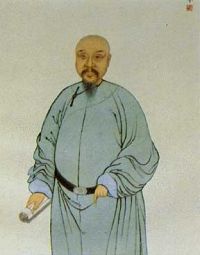Lin Zexu
Lin Zexu (林则徐) is regarded as a national hero and patriot in China's modern history for his fight against the British opium trade in Guangzhou. He exemplified greatness not only in his firm resistance to foreign aggression, but also in his initial openness to the outside world which charted a new era of learning from the West.
Lin was born in Fuzhou, Fujian Province, on Aug. 30, 1785. A formidable bureaucrat known for his competence and high moral standards, he rose rapidly through various grades of provincial service and became viceroy of Huguang in 1837, where he launched an opium suppression campaign.
Lin was sent to Guangdong as imperial commissioner by the Daoguang Emperor in late 1838 to halt the illegal importing of opium from the British. He arrived in March 1839 and made a huge impact on the opium trade within a matter of months.
He reinforced the coastal defense and called people to organize their armed forces. Foreign opium dealers were forced to forfeit their opium stores in three days and made to promise to never do such business again. Lin vowed that "I will never retreat until the opium is completely destroyed, and nothing can stop me." The foreign merchants were finally forced to give up nearly 1.2 million kg (2.6 million pounds) of opium, which was destroyed at the foreshore of Humen Town. Such a historic event demonstrated the Chinese people's resolution of resisting foreign aggression and clearing off the opium.
Besides such heroic actions, Lin is also recognized as the first person of the Qing Dynasty to open Chinese minds to the outside world. The politically corrupt Qing Dynasty closed the country to international communication and arrogantly refused Western science. Superstition and blindness prevailed in Qing society, and many senior officials did not know even where Great Britain was located.
To secure advantages in future conflicts with the West, Lin Zexu led some intellectuals in translating foreign books and newspapers in his yamun, an official residence provided for Chinese officials. "On the World" (Sizhou Zhi) and "Foreigners' Thoughts on China" (Huaxia Yiyan) are some remarkable representative examples. These efforts substantially broadened Lin's vision and enriched his knowledge on military strategy and the world. He advocated absorbing the West's advanced technology and buying their cannons and ships to resist to their aggression. In January 1840, he began to equip the Humen fortress with 200 modern cannons bought from the West. His vision on requiring a better knowledge of the world enabled him to become the advance guard of that age.
Lin died in 1850 while on the way to Guangxi, where the government sent him to help put down the Taiping Rebellion.
